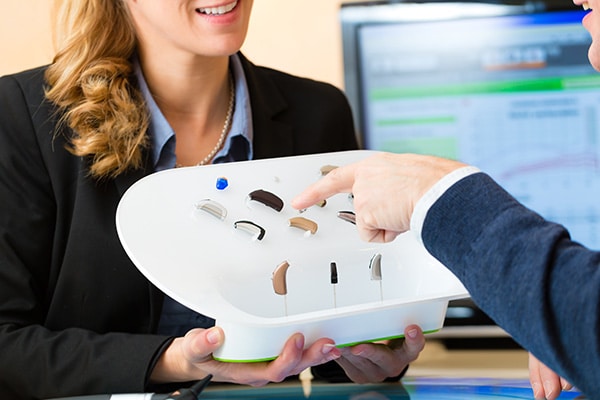
When your audiologist recommends hearing aids to you, you’ll learn how to use the devices you select, maintain them and what kind of batteries you will be using. This appointment is an important one to attend, as your hearing aids are an investment in your health and your future. During this appointment, you need to take in as much as you can about your hearing aid batteries and how to care for your devices in general. Of course, your audiologist will always be able to answer any questions that you have as you need to ask them, but it’s always good to have a handle on how to care for your hearing aids.
Batteries Are Essential
It’s important to note that your hearing aid batteries are a necessary piece of the hearing aid puzzle. They will always be an ongoing purchase for hearing aid wearers, and the type of battery that you need for your hearing aid depends on a lot of factors, from the style of your hearing aid to the size of it. Your audiologist will be able to tell you what type of hearing aid batteries you need for your specific hearing aid type, and they’ll be able to tell you where to buy them. However, these are vital for your hearing aids, and you cannot use them without working batteries.
Types Of Hearing Aid Batteries
Every single hearing aid out there needs batteries. Some are rechargeable and require charging each night after use through a dock or station. Did you know that hearing aid batteries are zinc-air operated? Removing the color-coded sticker for your battery type will allow oxygen to enter the battery and turn it on properly. Once the sticker comes off, the battery stays on until there isn’t any more power. The larger the hearing aid, the bigger the battery required. These batteries last longer compared to the smaller options like the completely-in-the-canal type. Always ask your audiologist what size hearing aid battery you need before you purchase the wrong one.
How Long Do Hearing Aid Batteries Last?
Hearing aid batteries run out of power much quicker than batteries from other devices. The size of the battery impacts how long it could last and as a rule, the bigger the battery, the better the longevity.
How Do I Make My Hearing Aid Batteries Last?
One of the biggest questions you will have for your audiologist is how you can maximize the life of your hearing aids. Unfortunately, there is no real way to extend it. However, there are several things that you can do to make sure that your hearing aid batteries last longer than they would usually. With these tips, you can make your hearing aid batteries last as long as possible when you care for them:
• When not in use, turn your hearing aids off.
• Open the compartment door where the batteries are kept; this can prevent moisture build-up.
• Make sure that you keep your batteries at room temperature at all times. Humid environments will make the battery life shorter and will mean that you spend more money on new batteries than necessary.
• Keep metal objects like keys and loose cash away from your hearing aid batteries. It’s rare, but this can short-circuit the battery and stop it from working prematurely. This is not what you need.
• If you don’t use your hearing aid batteries, they’ll remain charged and ready to go for three years. This is only the case if they are stored at the right temperature and in a dry environment.
How Can I Care For My Hearing Aid Batteries?
The best thing that you can do is be vigilant about when your hearing aid batteries need changing. When it comes to changing the batteries, you need to wash your hands thoroughly so that you can avoid adding dirt and debris in the battery compartment. Any dirt or grease can damage the hearing aid if you don’t wash your hands carefully. Also, you should always ensure that you remove any dead batteries straight away. Discharged and finished batteries can swell, becoming hard to remove from the chamber and making your hearing aids faulty.
The best thing that you can do to ensure that you care for your hearing aid batteries is to see an audiologist. Learn more about Kampsen Hearing and how we can help by calling this phone number: (813) 369-5692